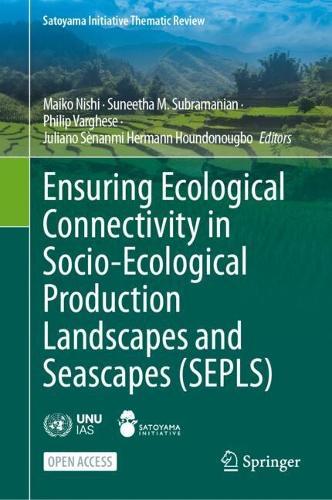Full Product Details
Author: Maiko Nishi ,
Suneetha M. Subramanian ,
Philip Varghese ,
Juliano Sènanmi Hermann Houndonougbo
Publisher: Springer Verlag, Singapore
Imprint: Springer Verlag, Singapore
ISBN: 9789819514731
ISBN 10: 9819514738
Pages: 275
Publication Date: 26 October 2025
Audience:
Professional and scholarly
,
Professional & Vocational
Format: Hardback
Publisher's Status: Active
Availability: In Print

This item will be ordered in for you from one of our suppliers. Upon receipt, we will promptly dispatch it out to you. For in store availability, please contact us.
Author Information
Dr. Maiko Nishi is a Professor of Department of Global Coexistence Studies, College of Bioresource Sciences, Nihon University and an Adjunct Professor of United Nations University Institute for the Advanced Study of Sustainability (UNU-IAS). She has engaged in research and capacity development activities related to the Satoyama Initiative over a decade. Her area of research interest includes social-ecological system governance, local and regional planning, agricultural land policy, landscape stewardship, biocultural diversity and sustainable businesses. In particular, her interest lies in multi-level governance, land tenure and use, and subjectivities of institutional actors in governing natural resources. She began her career as a consultant in urban planning and experienced projects related to participatory planning, rural water supply and regional development. She recently served as a Lead Author for the Intergovernmental Science-Policy on Biodiversity and Ecosystem Services (IPBES) thematic assessment on transformative change. Dr Suneetha M Subramanian is a Research Fellow with the United Nations University-Institute for the Advanced Study of Sustainability (UNU-IAS). She has been engaged in research and capacity building activities relating to: biodiversity, human well-being and sustainability, with a specific focus on cross-sectoral issues of equity, traditional knowledge, Policy-practice coherence, community well-being, assessment of changes to ecosystems and human wellbeing, She has also contributed to Regional, Global and Values Assessments of IPBES as Lead/ Co-ordinating Lead Author. Dr. Philip Varghese was a postdoctoral researcher at Akita International University and the United Nations University Institute for the Advanced Study of Sustainability (UNU-IAS) during 2022-2024. He has eight years of research and teaching experience at the university level. His research specializations include tourism and development politics, biodiversity, indigenous communities, global politics, and sustainability. He is currently with the Department of Political Science and International Studies at CHRIST University in India. Dr. Juliano S. H. Houndonougbo is currently a JSPS-UNU postdoctoral researcher at Chuo University (Japan) and the United Nations University Institute for Advanced Studies in Sustainability (UNU-IAS). He earned his Agricultural Engineering (Ing.) degree in Natural Resource Management and subsequently a Master of Science in Biodiversity and Natural Resource Management from the University of Abomey-Calavi (UAC) in Benin. Due to his special interest in Natural Resource Management, he began his doctoral studies at UAC in 2017, focusing on the ecology and conservation of a declining tropical fruit tree (Parkia biglobosa) in traditional agroecosystems in Benin, obtaining his Ph.D. in 2020. His research interests include applied landscape ecology, environmental change, and urban ecology.



